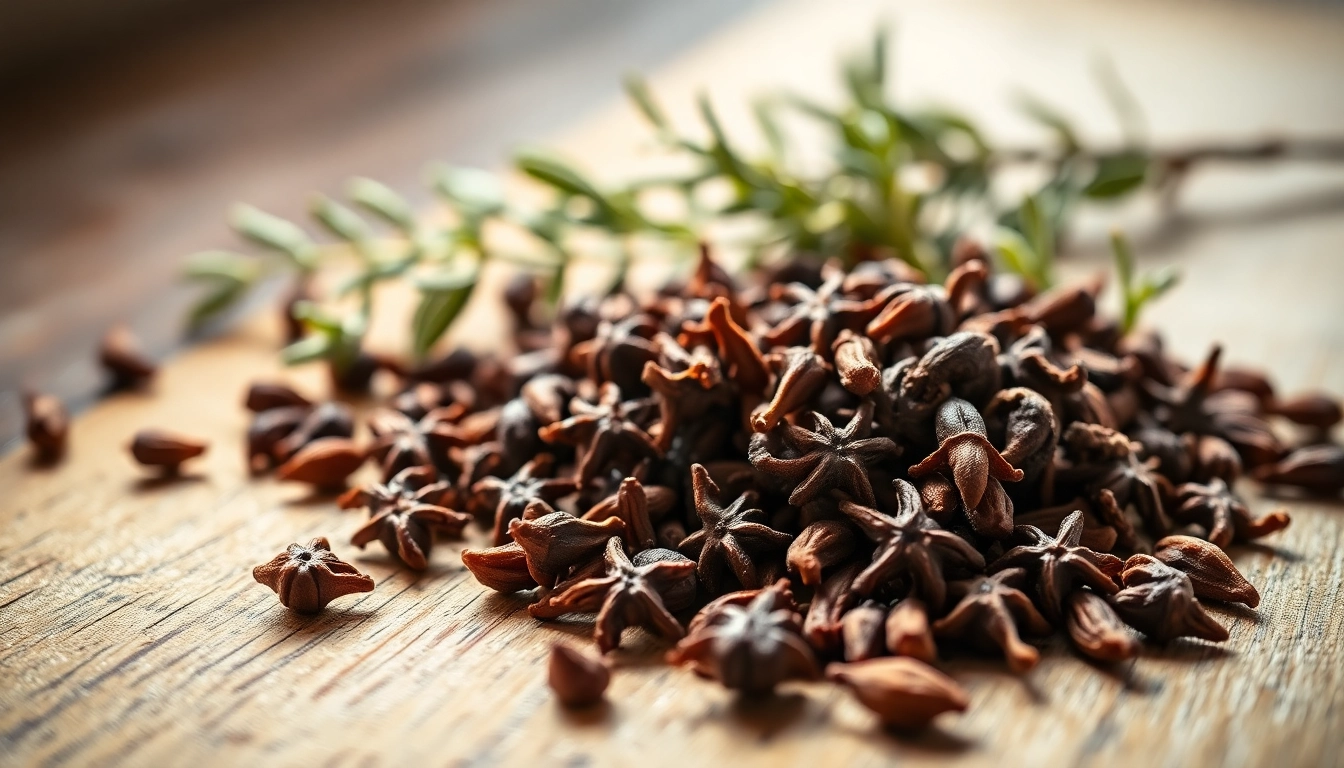Understanding Cloves: Botanical and Culinary Insights
Among the vast array of spices known to mankind, few are as aromatic and richly flavored as cloves. Claimed by many as a kitchen essential, this intriguing spice not only captivates the taste buds but also carries a wealth of historical and medicinal significance. Cloves, the dried flower buds of the tree Syzygium aromaticum, belong to the family Myrtaceae, and are native to the lush Maluku Islands, also known as the Spice Islands, in Indonesia. This article will explore the many dimensions of cloves, encompassing their origin, culinary uses, health benefits, and practical advice for incorporating them into your routine.
The Origin and Family of Cloves
The Syzygium aromaticum tree is a tropical evergreen, reaching heights of up to 30 feet and characterized by its long, glossy leaves and clusters of aromatic flower buds, which transform from bright red to brown as they dry. Rich in cultural history, cloves have been treasured for centuries, primarily for their robust flavor and health-promoting properties. They played a pivotal role in ancient trade routes and were sought after by traders, significantly impacting the economies of multiple regions across the globe.
Historically, cloves were used by various civilizations, including the Romans, who utilized them in cooking and preservation, and in traditional Chinese medicine where they were employed as a remedy for various ailments. The spice found its way to Europe in the Middle Ages, profoundly influencing culinary practices and becoming a symbol of wealth and luxury.
Culinary Uses of Cloves in Various Cuisines
Cloves have a unique flavor profile, characterized by a strong and warm aroma with notes of sweetness and slight bitterness. This complexity makes them a versatile ingredient in various culinary traditions around the world. In Indian cuisine, cloves are a key element in the spice blend garam masala and are used in biryani dishes, curry, and chai tea.
In Middle Eastern gastronomy, cloves are often utilized in meat dishes, adding depth and warmth. Additionally, the spice is a hallmark of festive recipes, prominently featured in gingerbread, pumpkin pie, and holiday mulled wine in Western culinary traditions.
Moreover, cloves are not restricted solely to savory dishes. They can be an unexpected yet delightful addition to fruits and sweets, enhancing flavors in desserts such as poached pears and spiced syrups.
Unique Flavor Profile of Cloves and Its Versatility
The flavor profile of cloves is complex and multifaceted, which allows them to blend seamlessly with both sweet and savory dishes. Their warming notes are attributed to the essential oil eugenol, which comprises about 70-90% of the oil in dried cloves.
This makes cloves not only delicious but also enriching when paired with other spices; for example, they heighten the flavors of cinnamon, nutmeg, and allspice in baking, while their pungency counterbalances the richness of meats and sauces.
Furthermore, cloves can be used in their whole form or ground into a fine powder, depending on culinary needs. Whole cloves release their flavor more slowly, making them ideal for infusing liquids or when cooking stews and broths, while ground cloves provide a more immediate flavor kick in baked goods and spice mixtures.
Health Benefits of Cloves: A Natural Powerhouse
Nutritional Value and Key Components of Cloves
In addition to their culinary allure, cloves are packed with nutrients and health benefits. They are an excellent source of vitamins, minerals, and dietary fiber. Each serving of cloves contains notable amounts of manganese, vitamin K, and omega-3 fatty acids. They also provide substantial antioxidant properties, primarily attributed to eugenol, which helps combat oxidative stress and inflammation in the body.
A study published in 2024 underscores the vital nutrients found in cloves, highlighting their potential to promote liver health, improve digestion, and boost overall immunity. Consuming small amounts regularly could help your body harness the myriad benefits they offer.
Cloves as Antioxidants: Protecting Your Body
The potent antioxidant properties of cloves, particularly due to the high levels of eugenol, make them a revered ingredient in natural health circles. Antioxidants play a crucial role in neutralizing free radicals—unstable molecules that can lead to cell damage and chronic diseases.
Incorporating cloves into your diet may help reduce oxidative stress, potentially lowering the risk of developing conditions such as heart disease, diabetes, and cancer. Their anti-inflammatory properties can also be beneficial in mitigating chronic inflammation, commonly associated with several health concerns.
Potential Therapeutic Uses of Cloves in Traditional Medicine
Cloves have been utilized in traditional medicine for centuries. They are known for their analgesic properties, making them a natural remedy for toothaches when used as clove oil or in gargles. Additionally, evidence suggests that cloves may support digestive health by alleviating bloating and gas.
Furthermore, some clinical studies indicate that cloves may hold antiviral and antibacterial properties, making them useful for combating infections and promoting overall health. Their incorporation into daily health regimens can be tailored to individual potential benefits, such as using clove oil for topical applications or consuming ground cloves in foods.
Integrating Cloves Into Your Daily Routine
Creative Recipes Featuring Cloves
Incorporating cloves into your daily meals can be both enjoyable and rewarding. Here are a few creative recipes to get you started:
- Spiced Apple Cider: Simmer apple cider with whole cloves, cinnamon sticks, and slices of orange for a fragrant, festive drink.
- Clove-Infused Rice: Add a few whole cloves to your boiling rice to impart a subtle flavor during cooking.
- Ginger and Clove Cookies: Adapt your ginger cookie recipe by incorporating ground cloves for a richer taste experience.
How to Brew Clove Tea for Digestive Health
Clove tea is a simple yet effective way to harness the health benefits of cloves. To brew clove tea, follow these steps:
- Boil 2 cups of water.
- Add 5-6 whole cloves and allow them to simmer for about 10 minutes.
- Strain the tea and add honey or lemon for added flavor as desired.
This tea not only aids in digestion but can also be soothing for sore throats and coughs.
Using Clove Oil for Skin and Dental Care
Clove oil is versatile and can be integrated into your skincare and dental hygiene routines. For dental care, simply apply a drop of clove oil onto a cotton ball and gently apply it to sore areas or sensitive gums. Due to its antiseptic and analgesic properties, it can help relieve pain and promote healing.
For skincare, dilute clove oil with a carrier oil and incorporate it into your skincare routine to combat acne and promote an even skin tone, benefiting from its antibacterial qualities.
Things to Consider: Precautions When Using Cloves
Possible Allergies and Sensitivities to Cloves
While cloves offer numerous benefits, it is crucial to be aware of potential allergies or sensitivities. Some individuals may experience allergic reactions, particularly those allergic to spices. Symptoms may include skin rashes or gastrointestinal discomfort. Thus, it’s advisable to start with small quantities when introducing cloves into your diet.
Clove Oil: Dosage and Safety Guidelines
When using clove oil, moderation is key. For dental applications, a few drops are sufficient for topical use. Do not ingest clove oil in large quantities, as it can lead to adverse effects. Always perform a patch test before using it on the skin, and consult a healthcare professional for guidelines tailored to your needs.
Consulting with Healthcare Providers Regarding Cloves
Before making significant changes to your diet or using clove supplements, it is advisable to consult healthcare providers, especially if you have pre-existing conditions, are pregnant, or are taking medications. They can provide personalized advice and ensure that incorporating cloves aligns with your overall health goals.
Where to Buy Quality Cloves: A Consumer’s Guide
Identifying High-Quality Whole Cloves
When shopping for cloves, consider the following tips for identifying quality products:
- Look for whole cloves instead of ground, as they typically hold more flavor and potency.
- Choose organic cloves when possible to avoid pesticide residues.
- Check the color; high-quality cloves should have a rich, deep brown color.
Online vs. Locally Sourced Cloves: Pros and Cons
Buying cloves online offers convenience and often a wider selection. However, purchasing from local sources supports community businesses and can provide freshness advantages. Be wary of poor-quality products with vague origins when shopping online; read reviews and check reputable suppliers.
Price Comparison and Value for Money in Clove Purchases
While prices for cloves can vary widely depending on their origin and quality, it’s important to balance cost with quality. Whole cloves from reputable brands may be more expensive, but their potency and flavor make them worth the investment, especially for culinary and health-related purposes.








Leave a Reply